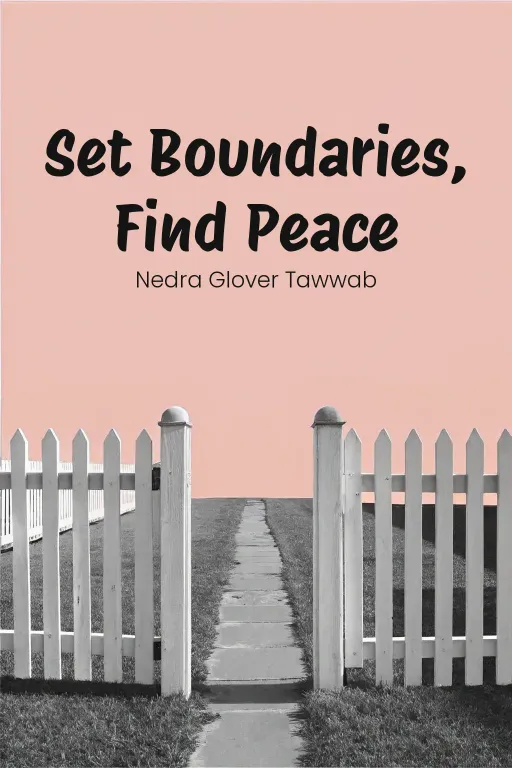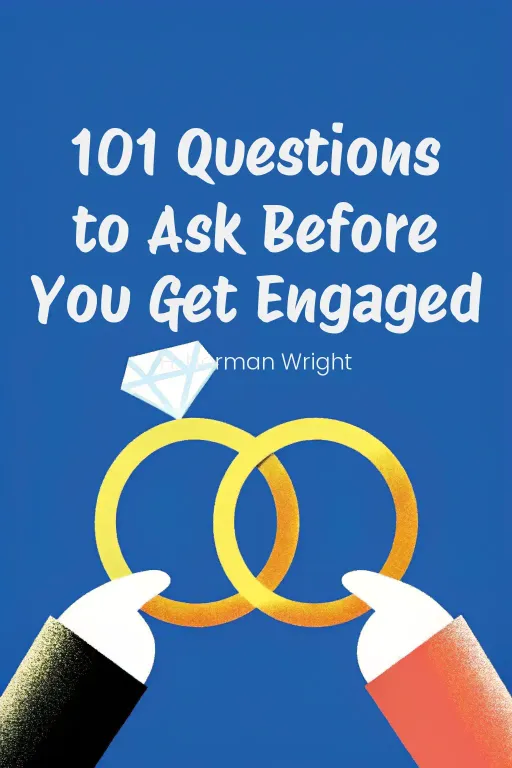
Boundary Breakthrough: Reclaim Your "Yes"!
Podcast by Beta You with Alex and Michelle
A Guide to Reclaiming Yourself
Introduction
Part 1
Alex: Hey everyone, welcome back! Today, we're tackling something super important for your peace of mind and overall well-being: boundaries. I mean, seriously, how often do we find ourselves saying "yes" when we're screaming "no" inside? Michelle: Alex, you're speaking my language. I'm totally guilty. So, are we about to hear how setting boundaries is the magical solution to burnout, guilt trips, and those excruciating family dinners? Alex: Precisely, Michelle! But it's more than just saying no. It's about taking back our time, our energy, and headspace. A lot of us are seriously overdue for a major overhaul in how we handle relationships and obligations. Michelle: A “life overhaul,” eh? Sounds... potentially disruptive. Alex: <Laughs> Potentially. That's where Set Boundaries, Find Peace by Nedra Glover Tawwab comes into play. It’s a powerful guide filled with real-life stories, practical advice, and insights that really break down why boundaries are so important. It shows you how they can reshape pretty much every aspect of your life—work, family, friendships, even how you treat yourself. Michelle: So, it's like learning to build a well-fortified fence around our emotional property? Alex: Exactly! Which brings us to what we’re covering today. We're going to unpack five key areas. First, the groundwork: what boundaries really are. Then, the challenges – those "cracks" that sabotage us. After that, we'll explore proven strategies for setting boundaries, how to handle it when people cross them, and ultimately, how all of this can lead to some pretty big personal changes. Michelle: Emotional infrastructure, got it. I hope my emotional toolbox is up to the task. Alex: Trust me, it will be! Stick with us as we dive in. By the end of this, you'll be ready to set boundaries like a pro.
Understanding Boundaries
Part 2
Alex: Okay, so let’s dive right in: What “are” boundaries, and why do we need them, right? Think of boundaries as, well, invisible lines. They define where “you” begin and where other people end. They're basically communicating what's okay and not okay with you, whether that's about your time, your emotions, your space…all of it. Michelle: So, like a personal “do not enter” sign, but, you know, maybe a little more polite? Or not, depending on the situation. But seriously, Alex, are they “really” that crucial? Can't people just…figure it out? Alex: That's the thing, Michelle – people aren't mind readers! Without those clear boundaries, we end up stretching ourselves too thin, feeling underappreciated, and eventually just burning out. Boundaries are about protecting your peace, sure, but also about keeping your relationships healthy. Because when we’re always saying yes because we feel guilty or we're scared to disappoint someone, that builds resentment. And nobody wants that. Michelle: True, like when you agree to help a friend move for the millionth time, and then you’re stuck carrying their heavy stuff up flights of stairs. Not that I’m speaking from experience, of course. Alex: Exactly! Really think about all the different kinds of boundaries we need to consider. You know, physical, emotional, time, material, intellectual, even sexual! Each one supports a different part of our lives. Physical ones, for instance, help us protect our personal space. Emotional boundaries? They let us decide how much emotional energy we’re willing to share. Michelle: Okay, so let's get real specific. Time boundaries, right? Everyone loves to push those! The boss who sends emails at midnight, or that friend who "just needs a quick favor" that ends up eating your whole day. How do we draw the line there? Alex: Time boundaries – definitely a tough one. It’s about making it clear how your time “can” and “can’t” be used. You need to calmly but firmly state your limits. Like, "I'm not available after 6 PM" or, "I can’t commit to this right now." Clarity is key. Michelle: And when you say clarity, are we talking about, like, war cries? Because if I say no, half the time I know I'm going to get pushback, like, "Oh, come on! It'll only take a minute!" Alex: Totally! And setting boundaries is partly about learning to stand your ground, even when people push back. Remember, it's not about being aggressive, it's about being consistent and prioritizing yourself. Let’s be honest, the biggest hurdle often isn't the other person–– it’s “us”. Michelle: Us? You mean that little voice in our head that's all, "You're so selfish if you don't help!" or, "What will they think of you if you say no?" Alex: Exactly! Social programming plays a big part. Think about Kim's story in Set Boundaries, Find Peace. She's a newlywed, career-driven, with a packed schedule. But she thought saying no was selfish, so she was overcommitting like crazy until she started feeling the weight of everyone’s expectations. Michelle: Yeah, the classic “perfection paradox," right? Everyone thinks they need to be perfect at work, home, in relationships – everywhere! But perfection is not only exhausting, it's impossible! Alex: Spot on! Kim had to realize that constantly giving without checking in with herself wasn't going to work. When she started putting some healthy boundaries in place, her stress went way down, and her relationships actually got “better”. Michelle: Alright, let's think about it from another angle. Take Erica from the same book. Her story isn't about overachieving, it's more about being overwhelmed, right? Especially as a parent. How do you set boundaries when you feel like you can't drop the ball? Alex: That’s such a great question. Erica's story really shows what happens when you try to do everything without asking for help or saying no. She was emotionally and physically drained and, you know, dreamed of running away – not because she didn't love her kids, but because she didn't have the boundaries she needed to feel sane. Michelle: That's the tricky part, isn't it? The guilt! Like, "If I take a break or ask for help, I'm letting people down." Alex: It is tough. But Erica realized that setting boundaries wasn’t about failing her family; it was about building a healthier dynamic for everyone. She started delegating chores to her kids, hired help, and communicated her limits to her ex-husband. Those little steps gave her energy back, so she could be more present as a parent. Michelle: So, bottom line, boundaries aren't just about saying no. They're about reclaiming your yes. Prioritizing what you truly care about and letting the rest go. Alex: 100 percent! And that brings us to the tools we can use to know where boundaries are needed, right? Self-awareness is a game-changer. Journaling or reflecting on situations that leave you feeling drained can help you pinpoint the problem areas, just like it did for Erica Michelle: Yeah, like, "Why am I irritated every time “this” person calls? Oh, yeah, because I feel like I have to fix their problems even when I'm tapped out." Alex: Exactly! I also like boundary mapping– listing out all your commitments and seeing if they actually align with your capacity. Like Kim used this to see where she was overbooked and where she needed to start saying no. Michelle: And then there's my favorite: metaphors. Remember the airplane oxygen mask thing? Take care of “your”self first, so you can help others! Which makes total sense at 30,000 feet, but somehow gets lost during the daily grind. Alex: That's where consistency and practice come in– setting boundaries gets easier the more you do it. And understanding the pressures that we've internalized can help us push past the guilt or fear. Michelle: Okay, Alex, I’m getting the bigger picture here. Boundaries aren't just about policing other people; they're about checking in with yourself. Letting go of the guilt, taking control of your time and energy, and opening up space for peace. Alex: Absolutely, Michelle! When we commit to boundaries, we're not just protecting ourselves; we're building healthier, more respectful relationships all around. So, if you're feeling overwhelmed, start small. Identify one area where you need a boundary – and take that first step.
Challenges in Setting Boundaries
Part 3
Alex: Now that we’ve established what boundaries are and why they're important, we can dive into the challenges that keep people from setting them. Consider this like, sort of building on that foundation. This section is really about understanding why setting boundaries can be so hard, which then sets the stage for the practical steps we’ll discuss later. Michelle: Okay, so now comes the good part, right? What makes saying “no” feel like an uphill battle? Let’s hear it, Alex. What's the big holdup? Alex: Well, there are so many things. One major factor is societal expectations. We're often taught that being selfless—or even sacrificing ourselves—is a virtue, right? And women, especially, are often taught to measure their worth by how much they give to others. This can create a really harmful cycle where people feel like they have to constantly prove their worth by putting everyone else's needs first. Michelle: Yeah, society's little mantra: “Be everything to everyone, all the time.” Just saying it makes me tired. Alex: Exactly! And that's actually illustrated really well by Kim’s story in the book. She was a newlywed juggling a demanding job, family commitments, and friends, and she was stretched incredibly thin. At first, she actually resisted setting boundaries because she thought saying no was selfish. Michelle: Let me guess – she ended up crashing and burning? Alex: Absolutely, she did. Exhaustion, anxiety, resentment. It all just built up until she couldn't keep going. Through therapy, she realized that setting boundaries wasn’t about being selfish, it was about self-preservation. Changing how she thought about it helped her see boundaries not as walls, but as a way to practice self-care. Michelle: But I mean, if you've spent your whole life being “Team Yes,” how do you even begin to change that? Society programs us to feel so guilty for prioritizing ourselves. Alex: Totally. That’s where guilt comes in, and it's another huge barrier. People often feel like they’re abandoning others or risking rejection if they start asserting their own needs. Erica's story in the book is another perfect example here. She was a mom who felt like she was drowning in household chores, but she was actually terrified to ask for help because she thought it would make her look weak or incompetent. Michelle: Right, because society basically tells moms they have to be superheroes. And guilt just loves to show up whenever asking for help enters the picture. It's like, “If I take a break, the world will fall apart!” Alex: Yes, exactly. Erica was afraid of being judged, but in reality, the only person judging her was herself. Learning to delegate tasks – things like giving her kids age-appropriate chores or hiring a house cleaner – didn’t make her less capable. It actually freed her up to focus on the things that really mattered. Michelle: But let’s be real: there's always a chance of someone pushing back, especially if they're used to you always saying "yes." What happens then? Alex: You're right, Michelle. Boundaries can bring underlying issues to the surface that need to be addressed. For example, there's Jamie in the book. Her boyfriend would actually guilt her whenever she asserted her needs, saying things like, "If you really cared about me, you wouldn't need space." Michelle: Oh, classic emotional manipulation. I guess boundaries can be a real mood killer for that kind of behavior. Alex: Definitely. And Jamie had to learn that feeling uncomfortable – both her own discomfort and the discomfort of others – is a normal part of these conversations. Avoiding them only made her frustration and disconnect worse. Michelle: So, avoidance becomes the real problem, doesn't it? You avoid the conversation, but you pay the price. Whether it's resentment, passive-aggressiveness, or just plain burnout, the cost of staying silent is high. Alex: Absolutely. Although, sometimes the biggest struggles with boundaries come from childhood experiences. It's not always just about society or guilt. Amber's story really highlights this. She grew up in a chaotic and unpredictable environment where her emotional needs were basically ignored. Michelle: Let me guess. Later in life, this caused her to either become super independent or completely shut down in relationships? Alex: Precisely. Amber built walls instead of boundaries, isolating herself from meaningful connections as a way to stay safe. But through therapy, she began to see boundaries as flexible and adaptive tools, not just impenetrable defenses. Michelle: Sounds like a huge shift in perspective. She went from saying "Stay away" to "This is how I can connect with you safely." Alex: Precisely. And we can all learn from her journey. Whether it's guilt, fear, societal expectations, or past trauma, these obstacles are real. But they're not insurmountable. The key is becoming aware of them. Things like journaling can help you identify where you're struggling. And reframing guilt, like seeing self-care as a way to be more present and helpful to others, can be transformative. Michelle: Or even just telling yourself it's okay to prioritize your own needs without feeling the need to apologize. It’s easier said than done, but it’s worth the effort. Alex: Exactly. This work isn't just about setting boundaries, it's about finding freedom. When you address these challenges, you're not just influencing how others treat you. You're changing how you treat yourself.
Practical Boundary-Setting Strategies
Part 4
Alex: Exactly, Michelle. So, we've talked about why boundaries are tough, but let's dive into the practical stuff. How do we actually set them? I mean, that's where the rubber meets the road, right? Let's unpack some strategies, starting with one of my favorites: "I" statements. Michelle: Ah, yes, the "I" statement. The classic "it's not you, it's me... but really, it is you" approach. <Laughs> What makes them so effective, Alex? Alex: Well, they're effective because they frame the boundary around your needs and feelings. That way, it's less likely to trigger defensiveness in the other person. For example, instead of saying, "You're always criticizing me!" – which is guaranteed to get someone's back up – you could say, "I feel hurt when I hear negative comments about my work. I'd really appreciate constructive feedback instead." Michelle: So, framing it as your perspective, rather than an attack on theirs, makes them less likely to explode. Makes sense. It's like... cushioning the blow with empathy. Alex: Exactly! And, uh, here's a great example from the book: Nicole and her husband, Malcolm. Nicole used to bottle up her frustrations, and when she finally did express them, it came out like an attack: "You don't help with anything around the house!" Of course, that just made Malcolm defensive, and they got nowhere. But switching to "I need us to work together on household chores so I don't feel overwhelmed" really shifted their dynamic. It opened up a dialogue, instead of triggering a fight. Michelle: So, saying "I need" instead of "You never" is like... tossing a lifeline instead of a hand grenade. Got it. But what happens when setting those boundaries triggers a pushback? I mean, not everyone's going to react like Malcolm. Some people just double down. Alex: That's true, and that's where the second strategy comes in: handling pushback with grace. You kind of have to anticipate resistance, especially if the relationship has been one-sided, right? Take Erica’s story, for instance. Michelle: Ah, Erica, the overwhelmed mom who finally said, “enough!” to being everyone's go-to person. Alex: Exactly! When Erica started setting boundaries – like hiring a housekeeper and involving her kids in chores – she faced immediate resistance. Her kids complained about the changes, and even her relatives made comments. But she stayed calm and firm, saying something like, "I understand this is an adjustment, but I need to take care of myself to take better care of you." Michelle: "Grace under family fire" – sounds like a superpower. Alex: It should be, right? But really, Michelle, it's about commitment. Erica didn't waver just because others pushed back. And over time, her consistency taught her family to adapt. Which brings us to the next point: consistency as the cornerstone of boundaries. Michelle: Okay, so consistency is key. But practically speaking, what does that look like? Alex: Let’s look at Jason’s story. He was dealing with an ex, Jessica, who would undermine him in front of their kids. Now, it would have been easy for Jason to downplay the issue, or let it slide to avoid conflict, but he recognized the harm it was causing. Michelle: Let me guess – Jason set a boundary, and Jessica immediately jumped on board? Alex: Not exactly. Jason calmly but clearly told Jessica, "It's important that we don't talk negatively about each other in front of the kids. They need to feel supported by both of us." When Jessica didn't respect this at first, Jason stuck to his boundary. He walked away from conversations when she crossed the line, reinforcing that this was non-negotiable. Michelle: And let me guess, that consistency is what eventually flipped the script? Alex: Bingo. Over time, Jessica adjusted her behavior, but here’s the– the beautiful, the “really” important part – Jason's consistency also set a powerful example for his kids. They saw their father modeling healthy boundaries, and that began to shift the whole energy in the household. Michelle: So, consistency isn't just repeating yourself – it's showing through your actions that this boundary is real, not just a suggestion. Alex: Exactly! And speaking of actions, there's another piece we need to clarify: assertiveness versus aggression. Michelle: Ah, the fine line between "I don't want to come across as a pushover" and "Oops, I may have overdone it." Alex: Right! Assertiveness is about standing your ground respectfully, while aggression is fueled by hostility, or an intent to dominate. Jamie's story from the book illustrates this perfectly. She needed more alone time in her relationship, but felt guilty whenever she brought it up, because her boyfriend guilt-tripped her. Michelle: Let me guess, he hit her with, "If you really cared about me, you wouldn't need space." Alex: Exactly! But Jamie learned to approach the conversation with assertiveness, saying, "I care about our relationship, but I also need time to recharge on my own. It doesn't mean I don't value us, it's just something I need to feel my best." Michelle: Respectful, direct, and clear. No room for misinterpreting that. Alex: And that’s the magic of assertive communication. It protects your boundary, while leaving space for collaboration, which is something aggression can never do. And when paired with tangible tools, like journaling and practicing scripts, it becomes even more effective. Michelle: Okay, journaling I get – you write out your frustrations, and spot patterns. But practicing scripts? Are we talking about standing in front of the bathroom mirror, rehearsing, "I need you to respect my time"? <Laughs> Alex: You laugh, but yes! Practicing those conversations with a friend, or with a therapist, can make you feel so much more prepared when you face those situations in real life. And boundary mapping is another great tool. By listing out your commitments and obligations, you can clearly see which areas are overloading you. Michelle: So, it's like drawing up the blueprints for your emotional house. Know your limits, figure out where the leaks are, and patch them up. Alex: That’s a perfect metaphor, Michelle. And, really, all of this – "I" statements, handling pushback, consistency, assertiveness – it all comes back to one thing: prioritizing your own well-being, without apology. Michelle: And in doing that, you're not just protecting your own peace, but you're encouraging healthier dynamics across the board. Boundaries aren't just about keeping people out – they're about figuring out how to let people in safely. Alex: Absolutely! And the more we practice these strategies, the more we realize that setting boundaries isn't just a kindness to ourselves – it's a gift to everyone in our lives.
Managing Boundary Violations
Part 5
Alex: Okay, so, once you've actually set those boundaries, the real work begins: managing violations and maintaining them over time. Because let’s be real, Michelle—boundaries? They're not a “set it and forget it” kind of deal. They need constant attention, especially when someone, intentionally or not, just decides to ignore them. Michelle: Exactly! People just love to test the waters, don't they? You put up this perfectly good fence around your personal space, and someone’s always gotta come along and try jiggling the gate, just to see what happens. So, managing these violations... what's the strategy here? Are we talking metaphorical barbed wire, or just... polite “No Trespassing” signs? Alex: Definitely more on the “polite sign” side, Michelle. Managing violations is really about resilience, about being adaptable. It’s about making sure your boundaries are respected, even when things get tricky. To simplify, there are three main things: differentiating healthy ultimatums from toxic cutoffs, dealing with those sneaky microaggressions, and handling those big emotional reactions like guilt or fear when your boundaries are tested. Michelle: Alright, let's dive right in. Healthy ultimatums versus toxic cutoffs—what is the actual difference? Because I always feel like ultimatums get a bad rap. They just sound aggressive, controlling, you know? Alex: That's a fair point! Ultimatums do have a bit of a negative image, but healthy ultimatums? They're completely different. It's all about setting clear expectations and consequences, but also leaving room for positive change. Like in Set Boundaries, Find Peace, there is Tiffany and Lacey. Tiffany felt kind of disconnected from Lacey because she was constantly on her phone when they were supposed to be spending time together. Instead of getting mad or just cutting Lacey off, Tiffany calmly said, “I need our time together to be phone-free. If this continues, I won’t be able to plan any more outings with you.” Michelle: Yeah, I like that. It’s specific, it's firm, but fair, right? She’s basically saying, "This behavior is not working for me, but here’s how we can fix it." No personal attacks, no big drama. And the "I'll stop planning outings" part? Totally logical! It's not about revenge; it’s about protecting herself. Alex: Precisely. Now, compare that to toxic cutoffs. Those are those impulsive, like, super emotional reactions where you just sever ties without even trying to address the problem. Something like, “You’re always on your damn phone, I’m done with you!” Abrupt, escalating everything, and doesn't give any chance for understanding, right? Michelle: So, it's really all about the approach. Healthy ultimatums? They come from a place of caring and accountability. Toxic cutoffs are basically tantrums disguised as something else. Got any tips for staying in the “healthy” zone when those emotions are running wild? Alex: For sure. Take a moment and really ask yourself, “Okay, what's my goal here? Like, do I actually want a solution, or am I just trying to vent?” Healthy ultimatums need a calm, thoughtful tone and consequences that make sense. Toxic cutoffs are usually just reactive and super emotionally charged. Michelle: Okay, got it—constructive, not destructive, right? Alright, what about microaggressions? Those are the sneaky ones, right? These little comments that aren’t full-on abusive, but slowly chip away at your boundaries. Alex: Exactly! Microaggressions are often really subtle, super easy to miss, but over time, they can completely drain you. For example, Jamie's boyfriend in the book would make dismissive remarks like, “You’re being selfish for needing space.” On the surface, it seems minor, but it adds up over time, invalidates her feelings, and makes her feel like she doesn't have any control. Michelle: And that's the tricky part because calling them out can feel like confrontation. If Jamie says, “Hey, that’s not okay,” wouldn’t her boyfriend just get defensive or dismiss her completely? Alex: That's where delivery is important. Instead of blowing up or just letting it slide, Jamie learned to be assertive, but with a calm approach. Something like, “When you say that needing space is selfish, it makes me feel like my needs aren't important. I need you to respect my alone time so I can recharge and be a better partner.” Michelle: Huh, so you're bringing awareness to the issue, without making it a blame game. Like holding up a mirror, but not smashing it in their face. But what if the other person just still doesn’t get it? Alex: You might have to have the same conversation more than once. Consistency is really important here. And if the behavior is still happening, then maybe it’s time to think about consequences again—and deciding how much access someone can have to your energy if they keep ignoring your boundaries. Michelle: Fair enough. Okay, onto my favorite part—handling those emotional reactions. Because let’s face it, Alex, even if you're a boundary master, guilt, awkwardness, and fear are probably still going to show up when you don't want them to. Alex: Absolutely! Enforcing boundaries can really stir up a lot, but the key is learning to handle them without backing down. Let’s start with guilt. It’s common because we’ve been told that putting ourselves first? It's selfish. Michelle: Like Eric’s story in the book, right? His mom defended his dad's toxic behavior for years, and when Eric finally stood up to her, he felt this overwhelming guilt, like he was betraying her. Even though he was just standing up for himself. Alex: Exactly. And what really helped Eric was changing how he thought about that guilt. Instead of letting it run the show, he saw it as a sign that he cared about his relationship with his mom, but he also needed to protect his own peace. Changing that perspective is key. Michelle: Okay, but what about fear? Because honestly, that’s where I struggle with boundaries. The "What if they reject me?" question is always there. Alex: So many people struggle with fear, especially of conflict or losing a relationship. That’s what Eric faced when he told his dad, “I’ll only talk to you when you’re sober.” He was terrified of being cut off, but he knew that keeping up the unhealthy dynamic would cost him even more in the long run. Preparing for what might happen—good or bad—helped him get through that fear. Michelle: So, it’s about weighing the costs, right? What about sadness? Because boundaries can sometimes bring up grief, especially when you realize a relationship might not get better, no matter how clear you are. Alex: That’s one of the toughest parts. Eric’s story really highlights this, too. He felt this huge sadness when he set limits with his dad, because it forced him to face that his father might never change. But that sadness also brought clarity—it helped Eric focus on relationships that made him feel good. Michelle: And then there’s the awkwardness. Let’s be real—sticking to boundaries can make things weird, at least at first. Like those silent car rides when someone’s mad because you said no. Alex: It can definitely be uncomfortable, but it’s often just temporary. Eric felt those awkward silences when his family was getting used to his new boundaries. Over time, though, that discomfort faded because everyone adapted. Things like mindfulness and practicing what you want to say beforehand can help ease the tension there. Michelle: And speaking of tips, let’s not forget some of the MVPs: self-soothing, preparing, and having a good support system. Seems like those are the lifelines when those emotions kick in. Alex: For sure. Self-care after having tough conversations—like going for a walk or meditating—can really help you decompress. Practicing what you want to say helps you feel more confident, and talking to friends or therapists? It gives you validation and encouragement when things get difficult. Michelle: Alright, Alex, this all makes a lot of sense. Managing boundary violations isn’t just about dealing with other people—it’s also about managing your own emotions. Staying calm, clear, and centered is what keeps the whole system from falling apart.
Boundary-Based Growth
Part 6
Alex: So, Michelle, we've reached the final piece of the puzzle: how boundaries lead to long-term personal growth and healthier relationships. I like to think of it as the "home stretch," where everything finally clicks. It's about realizing that boundaries aren't just temporary fixes, but the real foundation for lasting change. Michelle: Ah, yes, the grand finale of our emotional renovation project, as you so eloquently put it. So, Alex, are you suggesting boundaries are, like, the secret sauce to a happy existence, or are we verging into self-help guru territory? Alex: A little of both, maybe? When we talk about growth through boundaries, it’s not just about saying "no" or drawing lines in the sand. It's about opening doors – to self-respect, healthier relationships, and, you know, emotional clarity. Think of boundaries as the launching pad for evolving as a person and in our relationships. Michelle: Alright, that's a pretty big claim. I’m intrigued. How exactly does setting these boundaries lead to these life-changing revelations? Alex: Let’s break it down with some examples from Nedra Glover Tawwab's Set Boundaries, Find Peace. Take Eric's story – it shows how boundaries can rebuild relationships and create space for growth. Michelle: Oh, yes, Eric, the guy whose family gatherings sounded like a therapy session waiting to happen. Was he the one stuck between the aggressive brother and the father struggling with addiction? Alex: That’s the one. For years, Eric bottled up his emotions, avoided arguments, and just accepted that dysfunction was normal. But after realizing his silence was actually fueling his resentment, he decided to make a change. Michelle: Let me guess, a dramatic family intervention and suddenly everyone's living in harmony? Alex: Not quite. Eric had to face some uncomfortable truths first. He set explicit boundaries. For example, he refused to answer calls from his father when he was drunk, and he asked his brother to stop criticizing their father during family gatherings. These were not easy conversations, believe me. Eric was terrified of being dismissed or, worse, making things even more tense. Michelle: Okay, so did it actually work, or did it just make things ten times worse? Alex: It did work, but slowly, gradually. At first, predictably, his father was defensive, and his brother pushed back. But Eric stayed firm, saying things like, "I'm happy to talk when you're sober, but not like this." Over time, they adapted, and the family dynamics began to shift. Eric even noticed a growing respect with his brother and more meaningful conversations with his father during his sober moments. Michelle: So, no overnight miracles. Just slow, incremental changes. But it sounds like it actually paid off. Alex: Exactly. Eric’s story shows that boundaries can create space for healing, even in deeply dysfunctional relationships. It's not a guaranteed fix all, but it opens the door to healthier patterns. Michelle: Okay, I concede that setting boundaries in tough relationships can be transformative. But what about the internal stuff, like our emotional baggage? Does that get lighter too? Alex: Absolutely. Consider Jason's case. He was co-parenting with his ex, Jessica, who constantly undermined him in front of their kids. Jason realized that by letting her get away with that behavior, he was compromising his peace and his kids' emotional well-being. Michelle: So, I'm guessing he finally put his foot down at some point? Alex: He did, but he was quite clear and respectful. He said, "We can't speak negatively about each other in front of the kids. It's not fair to them." Jessica didn't stop right away, but Jason's steadfastness, and setting a great example, led to lasting changes. Michelle: So, by prioritizing his emotional clarity, he ended up creating a ripple effect that benefited the kids and, eventually, Jessica too. Alex: Precisely. And that ripple effect touches your personal peace as well. Boundaries help you reclaim your emotional energy, so you're not constantly wasting it on situations or behaviors that just drain you. Michelle: But they're not rigid barriers, but something flexible, right? Like Amber, who learned to soften her walls to actually allow healthy connections. Alex: Exactly, Michelle. Amber's past trauma led her to build impenetrable barriers, thinking they would keep her safe. But they also isolated her. Therapy helped her see boundaries, not as solid walls, but as bridges. By loosening those rigid limits, she started forming relationships that were safe but also fulfilling. Michelle: So, boundaries aren’t a one-size-fits-all kind of deal. They shift based on the relationship and situation. Alex: Precisely. And tools like boundary mapping were a big help for Amber – and can be for anyone. By examining where our limits are too tight, or too loose, we can tweak them and grow. Michelle: Alright, let’s zoom out a bit. What happens when we stick with these boundaries for months, years even? What are the long-term benefits? Alex: Think about the ripple effects. First, you'll have stronger relationships. When you set clear expectations, you build trust and reduce misunderstandings and resentment, like we saw with Jason co-parenting or Eric navigating his family. Michelle: And healthier relationships lead to...a healthier you, I presume? Alex: Absolutely. Boundaries nurture emotional resilience and clarity. Remember Erica's story? By prioritizing herself and delegating tasks, she got her energy back and became a more present parent. Michelle: And let’s not forget the bigger picture, the cultural shifts. When we set boundaries, others start to follow. It's just like being a trendsetter, modeling respect and self-care in your circle. Alex: Exactly, Michelle. And ultimately, this isn't just about setting limits, it's about growth. Boundaries teach us to respect ourselves and others, creating a sense of peace that enriches every aspect of our lives. Michelle: Okay, Alex, I'll admit it—boundaries aren't just fences; they’re blueprints for a better life. It sounds like we should probably grab our emotional toolkits and get to work.
Conclusion
Part 7
Alex: Okay, everyone, as we bring this episode to a close, let’s just recap our conversation about “Set Boundaries, Find Peace”. We started by defining boundaries – those essential lines we draw to protect our time, our energy, our emotional well-being – and why they're so crucial in every part of our lives. Michelle: Right, and then we dug into why setting boundaries can be such a pain. Societal expectations, guilt, fear, even past traumas… we saw how all of that makes it way harder than it should be. Alex: Absolutely, but we didn't stop there! We talked about real strategies: using "I" statements, dealing with pushback, staying consistent, and really mastering how to communicate assertively. All meant to help you actually navigate difficult conversations well. Michelle: And we can't forget those boundary violations. We talked about how to handle them – discerning healthy ultimatums, addressing microaggressions, and dealing with unavoidable emotional baggage like guilt or fear. Alex: Finally, we looked at the transformative impact of boundaries. Whether it's healing relationships, cultivating self-respect, or just creating space for our own growth and development, boundaries “really” aren’t just about setting limits; they’re about liberation. Michelle: So, the bottom line is: boundaries aren’t being selfish, people. They're essentially the bedrock for solid relationships – with others and, more importantly, with yourself. Alex: Exactly! And here's our challenge to you: identify just one area in your life where setting a boundary could bring you more peace. Maybe it's saying 'no' to a particularly demanding request, or making time to truly rest and recharge. Start small, but just start. Michelle: Look, it might feel weird at first, but on the other side of that discomfort? Clarity, respect, and yeah, actual freedom. Alex: So, go ahead and take the first step. Remember, it's a process. Be patient with yourself, stay consistent, and maybe trust that every "no" is actually leading you to a healthier, more fulfilling experience. Michelle: So, to building those bridges and fences – whichever ones you need. Until next time, take good care of yourselves, and protect your peace. Alex: Goodbye for now!









